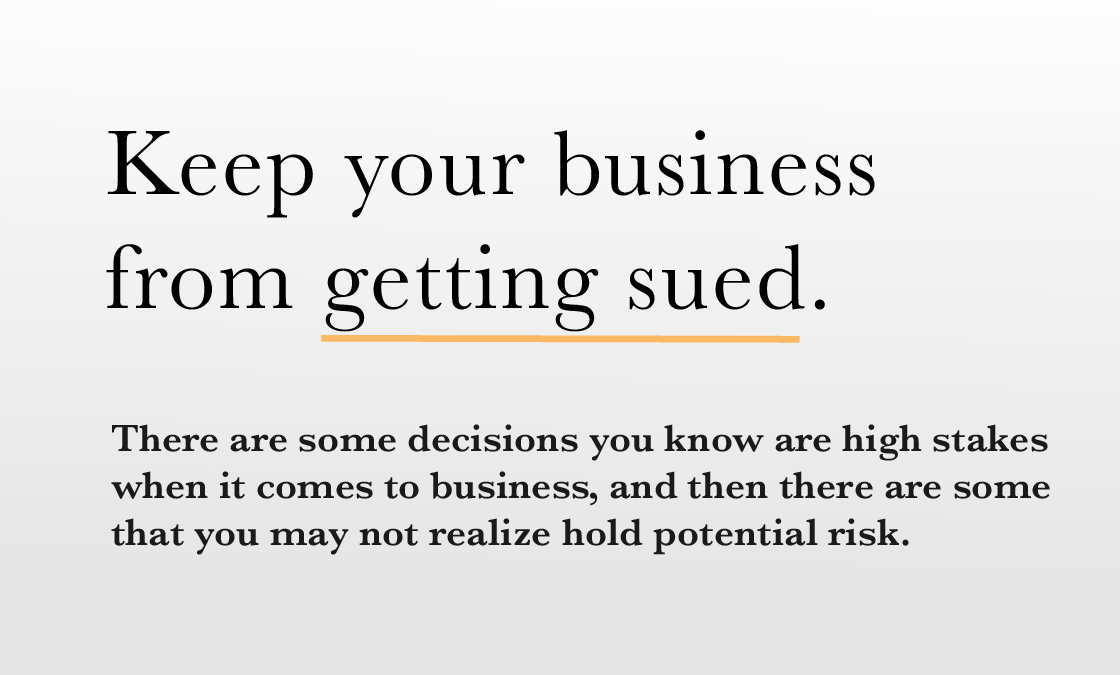There are some clients that I know, no matter what advice we give, no matter what we do, they are bound to enter into the courtroom. It is as if they are destined without any ability to avoid it.
The funny thing is that it is not the industry, nor the business climate, or even luck that gets them there. Some businesses, just do not get it and probably never will.
Some of it is ignorance, but mostly it is avoidance, but they all have certain habits in common:
6. They Underestimate the Cost of a Lawsuit
If you have been in business long enough, you have at least dipped your toes in litigation. Even without being in business, many of you likely have been deposed, subpoenaed, and even gone through a trial.
Ask anyone who has gone through it. Litigation is hell. The risk is not just losing the lawsuit. It is not just the legal fees that will likely cost six figures through trial for most business litigation matters, but the lesser known cost is what is just as bad.
Many business owners underestimate the time that they and their employees will have to devote to preparing discovery or appearing at a deposition or hearing. Little do they know the stress it can have on management and company culture in general.
If productivity is important to you, say goodbye. Efficiency during a lawsuit for a small business is nonexistent.
Avoid litigation at almost all cost. Very seldom does litigation actually make business sense. If you do not understand the cost of litigation, you will not give any importance to avoiding it.
5. They Lack Empathy with Employees
Employees are by far the biggest risk of a liability to any business. Those employers who are unable to relate to their employees are bound to create a company culture that is toxic.
Complying with each and every labor regulation under local, state, and federal law is virtually impossible for even large businesses that have dedicated HR departments. Your business will not be perfect.
The reality is that if your employees are happy, they are much less likely to file a suit for some minor labor law violation. Even in a case where a serious liability exists, an employee who perceives to have been treated fairly even after termination will produce positive results.
Of course, this is not always the case, but it is not a coincidence that the same employers get into legal trouble time and time again. They do not have better or smarter lawyers. They have empathy.
Minimizing employee legal risk starts at the hiring process and ends in the termination process, but your established policies matter even more. Too many times do employers implement policies that are in attempt to solve a problem that ignore other underlying issues.
Worried about employees faking an illness? Some employers may choose to subject such employees to grade-school policies of requiring a doctor’s note. Other may just focus on creating a work environment that makes employees want to work or even an open policy that gives employees flexibility to take breaks from work when they need it. It is not to say that a doctor’s note policy is archaic or not needed, but for some employers, it may be just missing the point.
Treat your employees like family. It is not how you perceive your treatment but how your employees perceive your treatment. A great company culture will minimize legal liability even when there is legal liability.
4. They Fail to Consider the Impact of Their Actions
The founder of Skiplagged, a site that takes advantage of hidden city airline pricing for consumers, gave an explanation to why United Airlines and Orbitz decided to file a lawsuit against this airfare search engine saying:
“Skiplagged is actually my side project so I haven’t really thought much about the business type.”
Yes, not much thought at all. Not only did Aktarer Zaman, owner of Skiplagged, not think of the repercussion of encouraging users to violate the terms of airline fare rules, but he failed to operate the site through any entity resulting in Zaman being sued personally.
Do not Operate Your Business in a Vacuum. Is your startup a market disruptor? Do not expect to displace a competitor without making an enemy that will do whatever it can to beat you back down.
3. They Ask the Wrong People for Legal Advice
Some of the worst business lawyers are Google, CPA’s, Reddit users, and “my family’s trust and estates attorney.” The issue is not that Google will not give you the correct answer or that CPA’s do not give great guidance on entity formation.
The reality is that there is too much subtlety in the law that it is often not obvious that certain advice is wrong. Even beyond any subtlety, there is also just a lot of misconceptions about the law out there.
The worst is online forums that aggregate and qualify advice based upon popular vote. Quora and Reddit are classic examples for this.
It is hard to use a real world example without putting some random user on a troll blast, but you can take a few moments and review some business related subreddits and find some real world advice on legal problems. Sometimes great advice, but many times the advice leads the original poster into unknown legal pitfalls.
For example, one user asks (changed for anonymity): “I have a minority owner that is not pulling their weight, how can we get rid of him?”
The highest ranked comment advises to sell all the assets to a new entity without the minority owner for a small amount of money, effectively kicking the minority owner out of the business.
Probably not good practical advice either, but what the other up-voters miss is that as soon as the new entity is successful, it will become worth it for the former minority owner to sue for minority oppression and if successful, disgorge the other owners from ill-gotten gains.
For some reason, Reddit is full of this advice.
Rely on the advice of those you pay to protect you. Free advice, whether it comes from an online source or a friend, is helpful to know whether there may be an issue, but do not rely on it unless you are paying for it.
2. They Fail to Seek Help Early Enough
The difficult part of lawyering is not understanding or applying the law, but knowing what law to understand or apply. For some businesses, not engaging in legal help early enough could just be a waste of time.
This firm has reluctantly buzz killed more than a handful of zealous entrepreneurs with seemingly great ideas until they found out the legal obstacles.
Granted, lawyers tend to be gatekeepers, per their job description, that often stifle innovation and progress. Waiting too long, however, can result in more than just a waste of time and/or money if the whole business model may not be compliant with the law. Once a law has been broken or a breach of a term has occurred, no attorney can unring that bell (most of the time).
Seeking legal advice is a part of the planning process. Even if it is just a quick phone call giving an attorney the opportunity to confirm whether there are some red flags or major issues to consider.
1. They Are Just Plainly Arrogant
CEO’s and founders need to be confident, but it is the overconfidence (or arrogance) that really gets them into trouble. All businesses make mistakes, but when the decision makers have egos that may be damaged from conceding even the most minor matters, the wronged party tends to escalate.
Arrogance gets in the way during the litigation process. This firm has witnessed first hand a 14-month battle of egos between two CEO’s of competing companies (one of whom was our client). The result? Our client ended up with six figures in legal fees and settling for a walk-a-way (where both parties dismiss and go their separate ways). The net result was 14 months of stress, distraction and bad publicity and some litigation attorneys who had a nice job for a year.
Just take a look at Uber and what a $41 billion valuation can do to a CEO. They have made a ton of PR and legal mistakes, but it is the manner for which they did it that garnered the attention of class action attorneys and city prosecutors.
Check Your Ego at the Door. Business is personal, but that does not mean you have to act like its personal.


![The New Frontier: Navigating Business Law During a Pandemic [310]](https://www.pashalaw.com/wp-content/uploads/2020/12/Pasha_LSSB_Epidsode308_Covid_Web-1-1024x683.jpg)

![Responding to a Government Requests (Inquiries, Warrants, etc.) [e290] How to respond to government requests, inquiries, warrants and investigation](https://www.pashalaw.com/wp-content/uploads/2017/10/iStock_57303576_LARGE-1024x683.jpg)
![How to Respond to a Crippling Error in Your Business [e153] How to Respond to a Crippling Error in Your Business](https://www.pashalaw.com/wp-content/uploads/2015/02/How-to-Respond-to-a-Crippling-Error-in-Your-Business.jpg)




![Law in the Digital Age: Exploring the Legal Intricacies of Artificial Intelligence [e323]](https://www.pashalaw.com/wp-content/uploads/2023/11/WhatsApp-Image-2023-11-21-at-13.24.49_4a326c9e-300x212.jpg)
![Unraveling the Workforce: Navigating the Aftermath of Mass Layoffs [e322]](https://www.pashalaw.com/wp-content/uploads/2023/07/Untitled-design-23-300x212.png)
![Return to the Office vs. Remote: What Can Employers Legally Enforce? [e321]](https://www.pashalaw.com/wp-content/uploads/2023/01/Pasha_LSSB_321_banner-300x212.jpg)
![Explaining the Hans Niemann Chess Lawsuit v. Magnus Carlsen [e320]](https://www.pashalaw.com/wp-content/uploads/2022/10/LAWYER-EXPLAINS-7-300x169.png)
![California v. Texas: Which is Better for Business? [313]](https://www.pashalaw.com/wp-content/uploads/2021/07/Pasha_LSSB_CaliforniaVSTexas-300x212.jpg)
![Buyers vs. Sellers: Negotiating Mergers & Acquisitions [e319]](https://www.pashalaw.com/wp-content/uploads/2022/06/Pasha_LSSB_BuyersVsSellers_banner-300x212.jpg)
![Employers vs. Employees: When Are Employment Restrictions Fair? [e318]](https://www.pashalaw.com/wp-content/uploads/2022/05/Pasha_LSSB_EmployeesVsEmployers_banner-1-300x212.jpg)
![Vaccine Mandates Supreme Court Rulings [E317]](https://www.pashalaw.com/wp-content/uploads/2022/02/WhatsApp-Image-2022-02-11-at-4.10.32-PM-300x212.jpeg)
![Business of Healthcare [e316]](https://www.pashalaw.com/wp-content/uploads/2021/11/Pasha_LSSB_BusinessofHealthcare_banner-300x212.jpg)
![Social Media and the Law [e315]](https://www.pashalaw.com/wp-content/uploads/2021/10/WhatsApp-Image-2021-10-06-at-1.43.08-PM-300x212.jpeg)
![Defining NDA Boundaries: When does it go too far? [e314]](https://www.pashalaw.com/wp-content/uploads/2021/09/Pasha_LSSB_NDA_WordPress-2-300x212.jpg)
![More Than a Mistake: Business Blunders to Avoid [312] Top Five Business Blunders](https://www.pashalaw.com/wp-content/uploads/2021/06/Pasha_LSSB_Blunders_WP-1-300x212.jpg)
![Is There a Right Way to Fire an Employee? We Ask the Experts [311]](https://www.pashalaw.com/wp-content/uploads/2021/02/Pasha_LSSB_FireAnEmployee_Website-300x200.jpg)
![The New Frontier: Navigating Business Law During a Pandemic [310]](https://www.pashalaw.com/wp-content/uploads/2020/12/Pasha_LSSB_Epidsode308_Covid_Web-1-300x200.jpg)
![Wrap Up | Behind the Buy [8/8] [309]](https://www.pashalaw.com/wp-content/uploads/2020/11/Pasha_BehindTheBuy_Episode8-300x200.jpg)
![Is it all over? | Behind the Buy [7/8] [308]](https://www.pashalaw.com/wp-content/uploads/2020/09/iStock-1153248856-overlay-scaled-300x200.jpg)
![Fight for Your [Trademark] Rights | Behind the Buy [6/8] [307]](https://www.pashalaw.com/wp-content/uploads/2020/07/Fight-for-your-trademark-right-300x200.jpg)
![They Let It Slip | Behind the Buy [5/8] [306]](https://www.pashalaw.com/wp-content/uploads/2020/06/Behind-the-buy-they-let-it-slip-300x200.jpg)
![Mo’ Investigation Mo’ Problems | Behind the Buy [4/8] [305]](https://www.pashalaw.com/wp-content/uploads/2020/05/interrobang-1-scaled-300x200.jpg)
![Broker or Joker | Behind the Buy [3/8] [304] Behind the buy - Broker or Joker](https://www.pashalaw.com/wp-content/uploads/2020/04/Joker-or-Broker-1-300x185.jpg)
![Intentions Are Nothing Without a Signature | Behind the Buy [2/8] [303]](https://www.pashalaw.com/wp-content/uploads/2020/04/intentions-are-nothing-without-a-signature-300x185.jpg)
![From First Steps to Final Signatures | Behind the Buy [1/8] [302]](https://www.pashalaw.com/wp-content/uploads/2020/04/first-steps-to-final-signatures-300x185.jpg)
![The Dark-side of GrubHub’s (and others’) Relationship with Restaurants [e301]](https://www.pashalaw.com/wp-content/uploads/2015/04/When-Competition-Goes-Too-Far-Ice-Cream-Truck-Edition-300x201.jpg)
![Ultimate Legal Breakdown of Internet Law & the Subscription Business Model [e300]](https://www.pashalaw.com/wp-content/uploads/2019/05/Ultimate-Legal-Breakdown-of-Internet-Law-the-Subscription-Business-Model-300x196.jpg)
![Why the Business Buying Process is Like a Wedding?: A Legal Guide [e299]](https://www.pashalaw.com/wp-content/uploads/2019/03/futura-300x169.jpg)
![Will Crowdfunding and General Solicitation Change How Companies Raise Capital? [e298]](https://www.pashalaw.com/wp-content/uploads/2018/11/Will-Crowdfunding-and-General-Solicitation-Change-How-Companies-Raise-Capital-300x159.jpg)
![Pirates, Pilots, and Passwords: Flight Sim Labs Navigates Legal Issues (w/ Marc Hoag as Guest) [e297]](https://www.pashalaw.com/wp-content/uploads/2018/07/flight-sim-labs-300x159.jpg)
![Facebook, Zuckerberg, and the Data Privacy Dilemma [e296] User data, data breach photo by Pete Souza)](https://www.pashalaw.com/wp-content/uploads/2018/04/data-300x159.jpg)
![What To Do When Your Business Is Raided By ICE [e295] I.C.E Raids business](https://www.pashalaw.com/wp-content/uploads/2018/02/ice-cover-300x159.jpg)
![General Contractors & Subcontractors in California – What you need to know [e294]](https://www.pashalaw.com/wp-content/uploads/2018/01/iStock-666960952-300x200.jpg)
![Mattress Giants v. Sleepoplis: The War On Getting You To Bed [e293]](https://www.pashalaw.com/wp-content/uploads/2017/12/sleepopolis-300x159.jpg)
![The Harassment Watershed [e292]](https://www.pashalaw.com/wp-content/uploads/2017/12/me-2-300x219.jpg)
![Investing and Immigrating to the United States: The EB-5 Green Card [e291]](https://www.pashalaw.com/wp-content/uploads/2012/12/eb-5-investment-visa-program-300x159.jpg)
![Responding to a Government Requests (Inquiries, Warrants, etc.) [e290] How to respond to government requests, inquiries, warrants and investigation](https://www.pashalaw.com/wp-content/uploads/2017/10/iStock_57303576_LARGE-300x200.jpg)
![Ultimate Legal Breakdown: Employee Dress Codes [e289]](https://www.pashalaw.com/wp-content/uploads/2017/08/Ultimate-Legal-Breakdown-Template-1-300x159.jpg)
![Ultimate Legal Breakdown: Negative Online Reviews [e288]](https://www.pashalaw.com/wp-content/uploads/2017/06/Ultimate-Legal-Breakdown-Online-Reviews-1-300x159.jpg)
![Ultimate Legal Breakdown: Social Media Marketing [e287]](https://www.pashalaw.com/wp-content/uploads/2017/06/ultimate-legal-breakdown-social-media-marketing-blur-300x159.jpg)
![Ultimate Legal Breakdown: Subscription Box Businesses [e286]](https://www.pashalaw.com/wp-content/uploads/2017/03/ultimate-legal-breakdown-subscription-box-services-pasha-law-2-300x159.jpg)
![Can Companies Protect Against Foreseeable Misuse of Apps [e285]](https://www.pashalaw.com/wp-content/uploads/2017/01/iStock-505291242-300x176.jpg)
![When Using Celebrity Deaths for Brand Promotion Crosses the Line [e284]](https://www.pashalaw.com/wp-content/uploads/2017/01/celbrity-300x159.png)
![Are Employers Liable When Employees Are Accused of Racism? [e283] Racist Employee](https://www.pashalaw.com/wp-content/uploads/2016/12/Are-employers-liable-when-an-employees-are-accused-of-racism-300x159.jpg)
![How Businesses Should Handle Unpaid Bills from Clients [e282] What to do when a client won't pay.](https://www.pashalaw.com/wp-content/uploads/2016/12/How-Businesses-Should-Handle-Unpaid-Bills-to-Clients-300x159.png)
![Can Employers Implement English Only Policies Without Discriminating? [e281]](https://www.pashalaw.com/wp-content/uploads/2016/11/Can-Employers-Impliment-English-Only-Policies-Without-Discriminating-300x159.jpg)
![Why You May No Longer See Actors’ Ages on Their IMDB Page [e280]](https://www.pashalaw.com/wp-content/uploads/2016/10/IMDB-AGE2-300x159.jpg)
![Airbnb’s Discrimination Problem and How Businesses Can Relate [e279]](https://www.pashalaw.com/wp-content/uploads/2016/09/airbnb-300x159.jpg)
![What To Do When Your Amazon Account Gets Suspended [e278]](https://www.pashalaw.com/wp-content/uploads/2016/09/What-To-Do-When-Your-Amazon-Account-Gets-Suspended-1-300x200.jpg)
![How Independent Artists Reacted to Fashion Mogul Zara’s Alleged Infringement [e277]](https://www.pashalaw.com/wp-content/uploads/2016/08/How-Independent-Artists-Reacted-to-Fashion-Mogul-Zaras-Alleged-Infringement--300x159.jpg)
![Can Brave’s Ad Replacing Software Defeat Newspapers and Copyright Law? [e276]](https://www.pashalaw.com/wp-content/uploads/2016/08/Can-Braves-Ad-Replacing-Software-Defeat-Newspapers-and-Copyright-Law-300x159.jpg)
![Why The Roger Ailes Sexual Harassment Lawsuit Is Far From Normal [e275]](https://www.pashalaw.com/wp-content/uploads/2016/07/WHY-THE-ROGER-AILES-SEXUAL-HARASSMENT-LAWSUIT-IS-FAR-FROM-NORMAL-300x159.jpeg)
![How Starbucks Turned Coveted Employer to Employee Complaints [e274]](https://www.pashalaw.com/wp-content/uploads/2016/07/iStock_54169990_LARGE-300x210.jpg)
